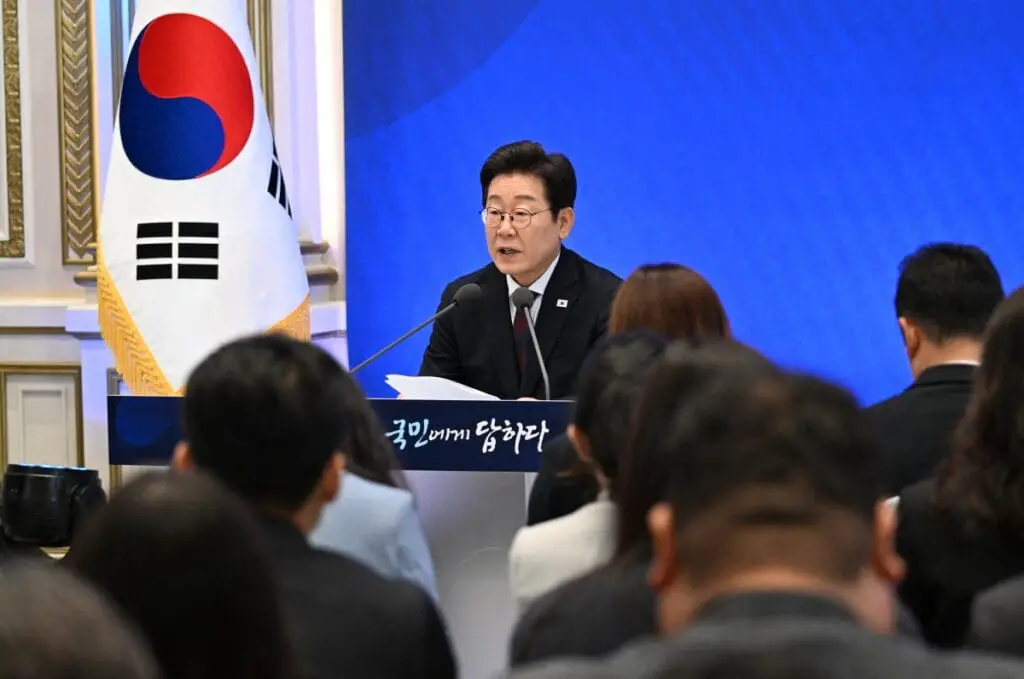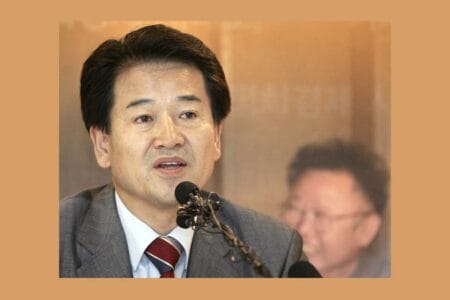August 14, 2025
SEOUL – The State Affairs Planning Committee, acting as a de facto transition team for President Lee Jae Myung, announced Wednesday that amending the Constitution will be a top priority among 123 agenda items in the president’s policy blueprint. The committee added that the proposed reform aims to reinforce the constitutional principle of popular sovereignty.
Also outlined in the Lee administration’s blueprint were a reform of the prosecution, as well as ways to increase South Korea’s potential economic growth rate to 3 percent, in large part through a wider adoption of artificial intelligence. This would be achieved by leveraging the country’s human talent, along with more than 50,000 graphics processing units, a next-generation power grid and a transition to renewable energy.
Some 210 trillion won ($152 billion) in fiscal spending will be directed over the next five years to achieving the 123 policy goals.
“We will work to foster unity among the people, overcoming conflict and division in favor of integration,” Lee said during a briefing to the nation at Cheong Wa Dae, the former presidential compound in Seoul. “Our goal is to drive innovative economic growth that ensures all can share in its benefits through balanced development.”
The committee did not elaborate on the direction or a time frame for the amendment, but Lee has previously hinted at allowing South Korean presidents to serve two four-year terms instead of the current, single five-year term.
“Ending the 1987 Constitution, (the Lee administration) will push to amend the Constitution based on citizen participation to open a new era,” said the ruling Democratic Party of Korea’s Rep. Lee Hae-sik, a member of the committee.
During the presidential campaign, Lee and his party suggested introducing a new presidential system through constitutional reform that the party said would curtail the power of the South Korean president. Under the proposal, presidents would be able to serve two four-year terms, with the reelection contest after the first term serving as a referendum on the sitting president’s performance.
In addition to the change in presidential terms, Lee, during his presidential campaign, floated a new system of stronger constitutional checks on presidential power, suggesting the Assembly would recommend candidates for prime minister and the president’s exercise of veto power would be restrained.
Following his inauguration in June, Lee expressed an intent to carry out constitutional reform as South Korea marked the Constitution Day holiday in July. Lee also wrote on Facebook that the newly amended Constitution would uphold the spirit of the Gwangju Democratic Uprising in May 1980 and encompass the greater fundamental rights of each citizen and greater local autonomy.
If implemented as planned, the constitutional amendment would be the first since the current Constitution was ratified in 1987, which introduced a single five-year presidential term.
Many of Lee’s predecessors — Moon Jae-in, Park Geun-hye, Lee Myung-bak and the late Roh Moo-hyun — also floated constitutional reform, but none of their proposals bore fruit. Disgraced former President Yoon Suk Yeol also expressed a willingness to entrust his presidential powers to the then-ruling People Power Party in December last year, after his sudden imposition of martial law threw South Korea into political turmoil.
Also among the 123 policy goals of the Lee administration is a widely anticipated push for a major reform to curb the power of South Korean law enforcement institutions such as the prosecution and police.
By 2030, the Supreme Prosecutors’ Office is to be disbanded, with the organization split into two. One will be dedicated to investigating serious crimes while the other will be dedicated to filing indictments of criminal suspects. This is largely in line with the liberal bloc’s claim that the prosecution’s power to both investigate criminal cases and bring suspects to court has often led to politically motivated persecutions.
Police are also to strive for political neutrality in part by abolishing the police bureau at the Ministry of Interior and Safety, which was established in 2022 during former President Yoon’s term, according to the committee.
Additionally, by 2030, South Korea will champion the mass adoption of AI with the goal of becoming a “top-three AI powerhouse,” according to the committee. Furthermore, an “electricity highway” will be built along the western coast of the Korean Peninsula, so that industrial complexes powered by renewable energy, aligned with initiatives such as RE100, can thrive along the new power grid infrastructure.
A leap forward through such technological advancements, coupled with blueprints for inclusive economic growth and market fairness, will allow South Korea to break away from the low-growth trap and achieve a potential economic growth rate of 3 percent during Lee’s term.
The State Affairs Planning Committee, currently led by Lee Han-joo, a longtime aide to Lee, will wrap up its two-month life span on Thursday.
According to the committee, the policy accomplishment will be managed jointly through the presidential office, the Office of the Government Policy Coordination and a newly established presidential committee on national futuristic strategy.







